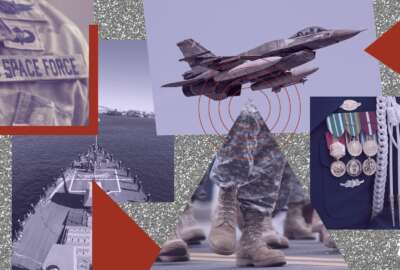

Hubbard Radio Washington DC, LLC. All rights reserved. This website is not intended for users located within the European Economic Area.
The Navy's International Programs Office (NIPO) is one of its lesser known components. It helps build maritime security and development partnerships.
The Navy’s International Programs Office (NIPO) is one of its lesser known components. It helps build maritime security and development partnerships. The Federal Drive with Tom Temin talked with NIPO’s new executive director, Karla Horn.
Interview transcript:
Tom Temin Let’s start with the Navy International Programs Office, itself. It’s not a very descriptive title. What exactly does NIPO do?
Karla Horn So international programs includes a lot of different activities, including our international security assistance programs, where we’re working individually with countries to provide them assistance. Cooperative development programs, where we cooperate with another country. And then technology security policy, where we review the release of our technology in the U.S. to other partners. So all three of those are kind of big moving parts. And the organization is led by Adm. Tony Rossi and myself. So a lot of moving parts there.
Tom Temin Wow. And I guess, a lot of this is predicated on the fact that, let’s face it, the U.S. Navy is probably the most capable pretty much on on earth, right?
Karla Horn Well, we like to think so, yes. But we can’t do it alone. And we need our partners. And having the interoperability with those partners is really important, and that’s where these sales and these cooperative agreements come into play.
Tom Temin Right. And for example, let’s talk about Taiwan to the extent that you can. We are changing the posture of the United States. The government is, at the moment, in Taiwan for various reasons. So that would involve the Navy. What form would that kind of help and cooperation typically take?
Karla Horn So the foreign military sails, absolutely. And different security assistance. So we’re working with them on equipment that they need, and ways that we can support them through our partnerships. And then we’ll continue to provide support after it, that’s one of the beauties of the the sale, where we sell them the equipment and then we continue on with parts and training and exercises. And it really builds a long-term relationship.
Tom Temin So, for example, and I’m just making this up, but would this be the type of thing suppose a country acquires or builds its own destroyer, a certain class of ship. There’s a lot of experience needed in, know how and maintenance issues, to operate a destroyer effectively. So the United States, in that case, might give transfer its know how to a friendly or allied nation. And here’s how the best way to maintain and operate a destroyer.
Karla Horn Yes, absolutely. And in fact, some of the equipment that we have sold to multiple countries, there’s even like a user group where we can exchange information amongst different countries, along with the U.S. But also, just back to your destroyer question, whether they built the equipment themselves in their own country, they may come to us later for follow on training and other types of partnerships.
Tom Temin And by the way, is the number of nations that have carriers growing?
Karla Horn Not that I know of, but I wouldn’t say they can really comment further on the growth of carriers.
Tom Temin Yeah, but I guess if you have a carrier, it takes hundreds of man years or person years to just to understand how to maintain and operate a catapult, let alone the rest of the carrier.
Karla Horn Yes. Well, even here in the U.S., it takes us ten plus years to build a carrier. And especially with the most recent class, all the modern technologies that we put into that class is just magnificent. So, yeah, it definitely takes a lot of time and a lot of effort.
Tom Temin And just briefly, how many billets are in NIPO? I imagine it’s a combination of uniforms and civilians, as we’re seeing this morning.
Karla Horn Yeah. It’s a combination. We have about 240 people total, and that includes approximately 40 military. We have a number of contracting support and then the rest is all civilians. And our civilians are certified professionals. We have a number of certification programs for security cooperation, acquisition, financial management. We have a lot of expertise here on our staff.
Tom Temin We’re speaking with Karla Horn. She’s the newly appointed executive director of the Navy International Programs Office. NIPO, I guess you’ve been there just a couple of months now. And you came from [Naval Sea Systems Command (NAVSEA)], where you were the comptroller. So you’re kind of a financial background person.
Karla Horn Yes. So the beauty of financial management is everybody needs money. So when you work in financial management, you get to learn a little bit about a lot of things. And the same goes here with our international partners. There are all different funding sources that we use, to whether it’s a country bringing their own money to the table or us working very closely with the State Department, because security cooperation is part of the U.S. foreign policy and run by the State Department. We work very closely with them on utilization of their funding to support partnerships. And then we have U.S. appropriated dollars that are used to support partners, for example, Ukraine. So there are all different funding sources. So that financial background actually comes in handy.
Tom Temin And what are some of the differences you found from being, say, the comptroller of a very large organization like NAVSEA, and now running a relatively small one like NIPO?
Karla Horn In my past experiences between working in small organizations and then even when I went to NAVSEA, as I told people, if you’re a financial person, whether it’s a dollar or a million dollars or a billion dollars, you focus on doing the right thing, following the rules, finding solutions. And to me, the dollar amount is just wherever you sit.
Tom Temin Sure. And getting back to NIPO, itself. Just tell us where in the hierarchy of the Department of the Navy that it sits.
Karla Horn So NIPO is, it’s a collection of acquisition professionals. So we actually report directly to the Assistant Secretary of the Navy for Research Development and Acquisition, ASNRDA. So we are part of the acquisition community, and we work directly with the acquisition organizations of the Navy. So NAVSEA, [Naval Information Warfare Systems Command (NAVWAR)], [Naval Air Systems Command (NAVAIR)]. Those are the organizations that are actually implementing the cases with the foreign partners, because oftentimes, what the foreign partners want to buy are things that we’re already buying here in the U.S. So we partner the country with the program office in the Navy that’s already buying that. Now, sometimes a partner may come and ask for something that we’re not currently buying for ourselves. And so we call that a nonprogram of record. And we do our best to support the partner. And they they pay for it. And, again, we try to create those relationships and provide them what they need.
Tom Temin And does that also include, maybe, transferring expertise to those other nations in the art of procurement, itself? Because the United States has a very well-developed procurement system based on certain principles, that aren’t necessarily extant in every country in the world.
Karla Horn I wouldn’t necessarily say that we are training them to do their own procurement. There are exceptions to that, of course. Like so, for example, in Afghanistan and Iraq, we tried to train the Afghans and the Iraqis to support themselves, to support their military and their police. And we tried to show them how we do it in the U.S. How we plan, how we program our dollars, and how we look for sustainment processes across the years. We try to do that with Afghanistan and Iraq. In terms of a lot of our partners that we have today, we enjoy having that relationship where they buy the item from us. They buy the same type of equipment that we have here in the U.S., and then we work together in exercises and interoperability. And so that’s kind of the ideal for us.
Tom Temin And when it comes to technologies that cannot be exported, there’s a large federal apparatus outside of the Navy that determines export controls and so forth. So there must be an intragovernmental activity that you get involved with also?
Karla Horn Yes. So you hit the nail on the head. There’s laws, there’s policies, there’s various organizations, there are boards. So it is definitely a wide range of involvement when determinations are made on releases of technology. And so we have an organization here in our office. We also have experts across the Navy who make recommendations. And like I said, there’s often board reviews for these types of release. And again, coordinating across the services and with the Defense Security Cooperation Agency.
Tom Temin And just to wrap up again with Karla Horn herself, you’re a lifetime Navy person or federal senior executive person. Tell us a little bit about yourself.
Karla Horn So mostly lifetime Navy. I actually started out as an intern with the Navy when I was in graduate school in Indiana State. And I remember my director of my political science department suggested I go to Washington, D.C. for an internship, and I’m from a small town of 1,200. So I couldn’t imagine moving to Washington, D.C. and the whole experience. And once I got here, I never left. I loved it. I worked at the Pentagon for 20 years, and I really enjoyed that experience and spent most of my time with the Navy. I worked in the secretary of Defense’s office, which is when I worked very closely with the Army on Afghanistan. And I had a great opportunity to work at U.S. Southern Command, down in Miami. And that was a really eye opening international experience for me, to be partnering with Central and South American and Caribbean countries, on everything from humanitarian assistance to disaster relief to drug interdiction. And so lots of interesting projects there that kind of piqued my interest over 20 years ago to end up here at NIPO. So I feel very fortunate.
Tom Temin And where the whole town could fit in one hallway of where you’ve worked.
Karla Horn Exactly.
Copyright © 2024 Federal News Network. All rights reserved. This website is not intended for users located within the European Economic Area.
Tom Temin is host of the Federal Drive and has been providing insight on federal technology and management issues for more than 30 years.
Follow @tteminWFED



